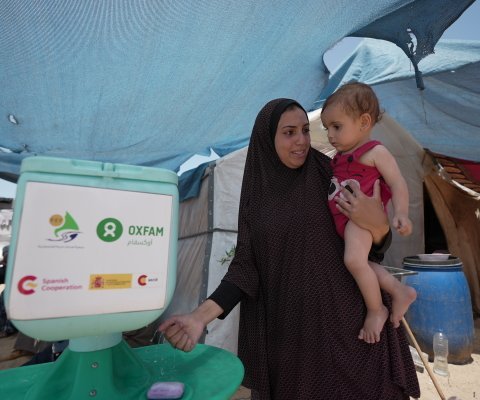New scorecard outlines lack of support for paid and unpaid caregivers
As American families are getting ready for back to school, new research shows that the United States gets a failing grade — 43 out of 100 — in supporting caregivers, both paid and unpaid. The scorecard, compiled by Oxfam with the National Women's Law Center, National Partnership for Women and Girls, and Notre Dame's Integration Lab, finds that federal policy largely fails to support the millions of people who provide care in the U.S.
Care work adds enormous value to our economy and society but remains largely invisible and under-valued. Worse yet, it often traps people in poverty. This reflects the fact that this work disproportionately falls to people facing historic inequities: women and girls, immigrants and refugees, and BIPOC.
“Across the country, parents are relieved to end the summer camp juggle and get their kids back to school, but many people engaged in paid and unpaid care—including the parents and guardians of children, those supporting disabled, ill, and elderly people, and care workers—continue to struggle under great physical and emotional pressure and experience deep financial hardship,” said Rebecca Rewald, Senior Gender Policy Advisor with Oxfam America. “Care work demands a lot, and provides enormous value to our economy and society, but returns scant rewards, and often traps people in poverty.”
The lack of adequate policies around unpaid and underpaid care work—paid sick leave, paid medical leave, paid parental leave, child care, care for people with disabilities, and migrant care workers' protections—leaves many Americans struggling to get by and thrive. While this failure hurts all of us, it poses specific dangers to the wellbeing of already-underserved communities and deepens structural inequalities. Our government needs to show it takes care work seriously and mandate better for those who provide and receive care.
“Parents feeding and nurturing children, health aides helping elderly, ill, and disabled people at home and in care facilities, preschool teachers, domestic workers... care work is the bedrock of our society and economy. It is the bedrock of our families, homes, schools, and businesses. It requires dedication, skill, and emotional and physical labor on a constant basis. So why aren’t we valuing and investing in the people who make our economy tick?” continued Rewald. “It’s time to elevate the fundamental importance of care work and change federal policies to support and respect the people whose labor keeps our economy and society functioning.”
Federal government mandates must provide better support for all caregivers and care workers. Oxfam calls for well-designed, well-funded, and widely accessible government policies and programs that facilitate people’s ability to give and receive care without sacrificing their livelihoods and well-being.
The U.S. must pass policies that support caregivers in the workplace through benefits like paid leave and flexible schedules, and our laws must strengthen and increase the accessibility of care services for all Americans. Oxfam also calls on the federal government to expand social protection policies and programs that support low- and middle-income families. Lastly, it is essential that the U.S. increases the federal minimum wage for all workers and strengthens equal pay laws, in addition to strengthening and expanding laws that protect workers’ rights.
Most importantly, these federal policies should center the most underserved communities, particularly women of color and immigrant women. When policies are developed for those who have historically been excluded or overlooked, we have a greater chance of tackling the injustices of poverty, inequality, racism, and sexism.
“The time has come for us to acknowledge that care work has been taken for granted and undervalued for far too long,” continued Rewald. “We need to elevate the importance and urgency of care, and value it as the vital part of our society and economy that it truly is: a collective good that must be supported by governments and given adequate investment.”
/ENDS
Notes to editors:
Find Oxfam’s media brief on the scorecard here.
Download the full report, “US Care Policy Scorecard: Assessing federal unpaid and underpaid care policies in the US,” and its policy recommendations here.


